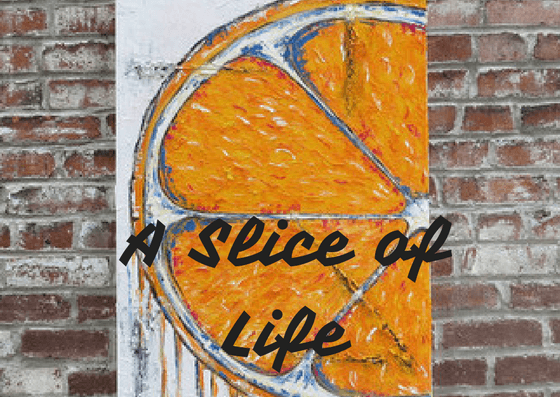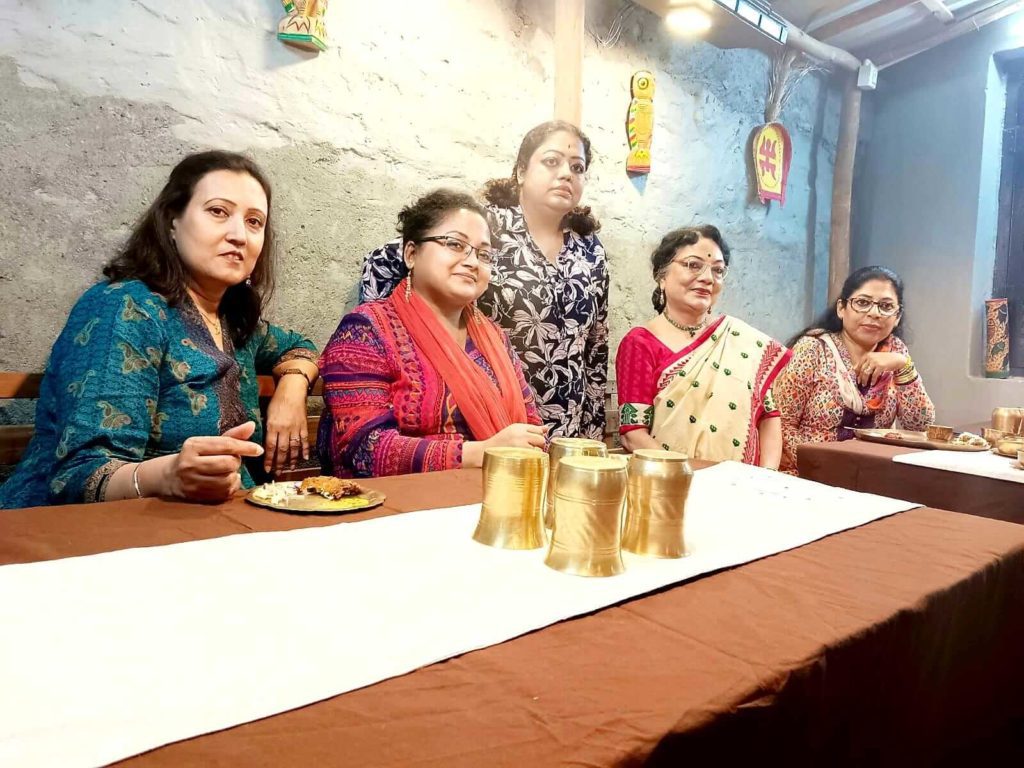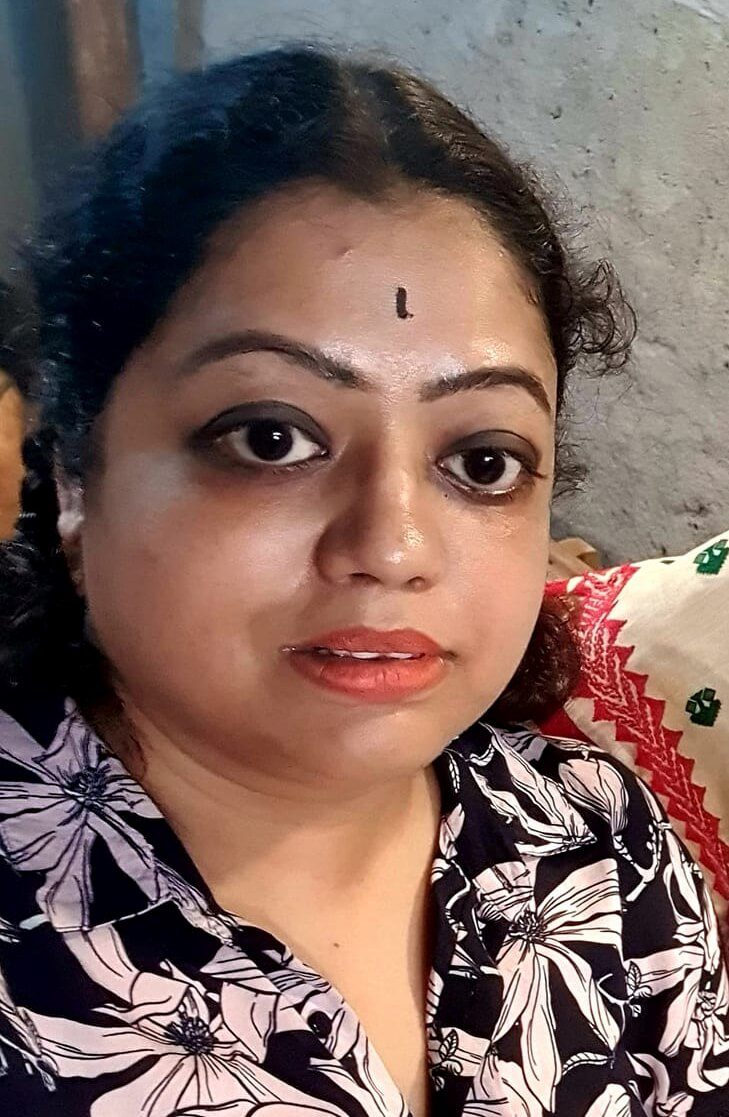Srovonti, a journalist, singer, and an entrepreneur, takes a leap of faith to establish The Bengal Ghorona (TBG), where a meal is an experience rooted to the rich Bengali lifestyle, culture, cuisine and more. Ruchira picks her brain in a candid interview, exclusively for Different Truths.

Hers is a familiar face in Kolkata’s elite circles. She rubs shoulders with the glitterati and who’s who in town. At live shows and events, she is seen reporting from ground zero. Occasionally, you find her belting out Tagore’s songs in her mellifluous voice. Meet Srovonti Basu Bandopadhyay. She wears many hats. She is a graduate from the reputed Dakshinee, school of music, a vivacious, energetic journalist with the Ananda Bazar Patrika group and most importantly, six years ago, she gave a concrete shape to her brainchild,The Bengal Ghorana (TBG). Always colourfully attired, with huge ebony eyes and cascading raven tresses, Srovonti is always raring to go. Never a dull moment for her. She speaks effusively about her life and experiences.
Ruchira: A music lover by default; please tell us how music came to you?
Srovonti: You could say I was exposed to music while still in my mother’s womb. Maa was an accomplished singer. My jethu (dad’s older brother), Partho Basu, was an active patron of performing arts and a connoisseur of Tagorean culture (read Rabindra Sangeet). At home, there was music round the clock. A sudden downpour some day and a homely singing session would begin. There would be impromptu pre-dinner singing bouts almost every night. My favourite pastime was playing Rabindra Sangeet antakshari with Jethu. He would often painstakingly explain the inner meaning and significance of each song. When I was a little older, Maa got me enrolled in Dakshinee school of music. However, I didn’t learn to sing in the conventional way (as per the syllabus) memorising the notations, focusing on the tunes and so on. Following my heart, I learnt the words first and subsequently the tunes. I never learnt to play the harmonium. Even today I’m comfortable with the taanpura.
Ruchira: We would like to hear about your musical gurus.
Srovonti: I was born into a musical environment and my mother was my first Guru. Other mentors were Sh. Rono Guhathakurta and Sh Sudip Guhathakurta. Moreover, I have had a good deal of interaction with the late Smt. Ritu Guha. Though I didn’t train directly under her, yet she inspires me greatly.
Ruchira: You label yourself as a reluctant journalist. How did you finally become one?
Srovonti: Everything happened by chance. To begin with my jethu (uncle) was a journalist with the Ananda Bazaar Patrika. So, he never wanted me to be one. As a kid, I often accompanied jethu/uncle to the iconic ABP office on Prafulla Sarkar Street. There I would meet literary luminaries like Sunil Gangopadhyay, Shirshendu Mukhopadhyay, Dibyendu Palit, Joy Goswami, who were my uncle’s friends. During my Jadavpur University years, I won the best all-round graduate and postgraduate awards for excellence in academics and co-curricular activities. As a fellow at the School of Cultural Texts & Records, I completed some projects on Tagore’s works. Unfortunately, owing to a certain problem, I decided to quit pursuit of academics and began job-hunting. There was a certain degree of pressure from the family too. I got an editor’s job with Banglalive portal. Later, I got a call from the ABP Group (my uncle had passed away by then), took a test and finally got selected for Ananda Bazar digital as content developer. I wrote original content besides editing others’ content. In late 2011, I started Bengali blogs on Ananda Bazar digital, which drew contributions from bigwigs. But suddenly it folded up and I was left high and dry. Thanks to timely intervention by two veteran scribes, Gautam Bhattacharya, and Tapas Sinha, I found a job in the print version. They were searching for a writer with a background in music. By then, I had graduated from Dakshinee. Hence, they found me eligible. Groomed by Gautam Bhattacharya, I blossomed into a features writer for Page 3 and entertainment beats. I enjoyed getting bylines and being noticed by people.
Ruchira: You have covered a galaxy of celebrities thus far, please share some interesting experiences. Also, some of your memorable performances
Srovonti: I have interviewed Asha Bhonsle ji, who incidentally had remarked, “If you want to be a successful career woman, skip marriage. They don’t jell.” Her words still ring in my ears. Overall, hers was an interesting interview. I also interviewed Ranbir Kapoor (a joyous fellow), Alia Bhatt, the thespian Dhritiman Chatterji, noted director-actors e.g., Kaushik Ganguli, Srijit, Shiboprosad to name a few. As for performances, I sang on the occasion of the late President, Sh. Pranab Mukherji’s book launch, soon after he demitted office. Lately, I got an opportunity, participated in the “Bochchorer best”, a prestigious event hosted by the Ananda Bazar online.

Ruchira: You were settling into a career. How did the idea of The Bengal Ghorana (TBG) strike you?
Srovonti: I had taken up journalism, but my heart was not in it. The working hours were erratic. I was unable to devote enough time to my baby. Singing, shows, music rehearsals took a backseat. So, one fine morning I quit my job. During this interval, Leena Gangopadhyay, Chairperson of West Bengal Commission for Women, and noted script writer/producer/director helped me to join the Commission. This opened new vistas before my eyes. I discovered the condition of women (cutting across social strata) was appalling and deplorable. So, we conducted statewide workshops and seminars and to ameliorate the condition of women and spread awareness against gender violence and inequality. Around this time, I also edited legendary vocalist Suchitra Mitra’s memoirs titled Suchitrar Diary (Karigar Publishing). A couple of years later, I was cajoled into rejoining ABP, as an entertainment editor. Yet, I was dissatisfied. I wanted to create something different. You see, I was brought up and lived all my life in a typical Bengali way. Also, this house (we are in) belongs to my Dad’s grandmother, Smt Labanyaprobha Dutta, an eminent Congress activist and freedom fighter. During its heydays, it was a hotspot of socio-cultural-intellectual activities (and food). So, I thought it would be worthwhile to preserve and uphold Bangaliyana as well as this edifice as a symbol of our heritage. Thus, The Bengal Ghorana (TBG) was born, the first ever ‘Home Dining’ in Kolkata.
Ruchira: You attract high profile, upmarket clientele, don’t you? Who are they?
Srovonti: Lots of people from the showbiz and entertainment industry. The likes of Rituparna Sengupta, Lopamudra Mitra, Joy Sarkar, Srijato, Shiboprosad Mukherji, Joy Goswami, Debshankar Halder, Monomay Bhattacharya, Jayati Chakrabarti, Srikanta Acharya, staffers from the Norwegian Consulate, head honchos from Bengal Chambers of Commerce. Once, the travel agents Thomas Cook had organised a guided tour for tourists – a close look at a typical Bengali household, ambience, décor, lifestyle, and cuisine – here at TBG.
Ruchira: Describe the step-by-step journey of TBG. Some memorable experiences. What has it given you?
Srovonti: Initially, I had considered holding monthly events, music, intellectual discussions, book reading, etc., alongside dining; but the way it has snowballed into a daily dining experience has gone even beyond my wildest dreams. It is heartening to observe how the world has reached out to me instead of me having to reach out to it. People come here from across the globe, Sri Lanka, USA, UK. Bangladesh, Germany, France, Italy, the UAE, among many. Such tremendous exposure is enriching for myself, my spouse, our daughter, mom-in-law, brother-in-law, and his family. Handling a medley of clients helps each one of us forget personal sorrows and strife and stand together as one family. Some of the clients eventually became personal friends. I recall a lady by the name of Anindita… who regularly entertained her guests here. This went on till the Corona came. Later, we were shocked to learn how the lethal virus took her life. She was so fond of TBG that her family ordered the food for the niyom bhongo ceremony (funeral meal) from our place. Another lady, based in Boston, came to Kolkata with her kid, checked into a hotel for a day – only to dine at TBG, before proceeding to meet her family, who lived in the countryside. It is touching to witness people sharing their milestones and rites of passage – engagement, stag party, baby shower, sacred thread, birthdays, and wedding anniversaries – here with us. Personally, it is an exhilarating experience.
Ruchira: Having pursued three distinct, challenging professions, would you, in retrospect, rate yourself as a feminist?
Srovonti: Well, ahem! I am not quite sure if I am an empowered woman, but yes, I struggled a lot throughout my life, underwent a multitude of experiences, good, bad, ugly, but I constantly kept myself busy, had my fingers in several pies at one go. I faced everything with my emotions under control. If you are an emotional fool, you are likely to be in solid trouble. I worked hard to achieve my targets and goals. Success was delayed but yes it did arrive. I hail from a bonedi family. Though we had pedigree, yet we were not financially strong. So, nothing came to me on a platter. I had to struggle hard. Yes, I empathise and sympathise with women at large because the overall condition of women (in the state) is abominable. No, I don’t intend to stand at a higher point and pull them up. On the contrary, I would want to enable them to walk side by side with me as comrades.
Photos sourced by the interviewer







 By
By

 By
By